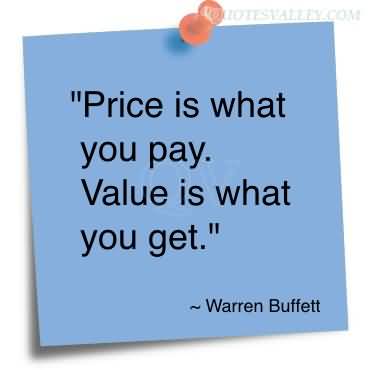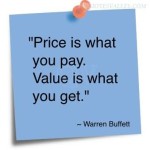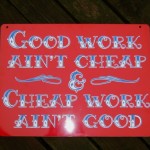‘You get what you pay for‘: Prov. Cliché If you do not pay much money for something, it is probably of poor quality; If you pay well for something, it is more likely to be of good quality (thefreedictionary.com)
This is one cliche I want to believe, though it’s far from being the unambiguous truth. At one extreme there are incredible bargains to be had and at the other you can pay through the nose for things which have no meaning or value but speak volumes for the size of your wedge. But in general if you want good quality stuff that’s built to last, of course you have to pay a but extra.
Don’t you? With so-called luxury goods the profit margin increases with the scarcity and exclusivity, and with many designer label clothes you would struggle to say the quality of the goods is any better than unlabelled equivalents. However you measure it, they don’t necessarily fit better, look better or wear better – though with any garment you may find precisely the right fit if you are lucky. But be ready to pay good money and get your clothes made to measure if you want to be sure that they will fit and last.
There are plenty of examples where you do get what you pay for. Consider beds: a bad one may cost less but may do your back in, may fall apart under you (this has happened to me, and not when I had any companion sharing the bed either!) or may simply be so uncomfortable you can’t get a wink of sleep. What’s the point of economising? Better to buy something with at least a degree of quality manufacture that will stand the test of time and will afford you some decent shut-eye.
Another example is orange juice. Time was when if you didn’t squeeze the fruit yourself the only option was a very thin and tasteless juice rehydrated from concentrates, which are of course cheaper to transport and are still available at the bargain basement end of the market – and taste like it. Now you can get many juices not made from concentrates, but also genuinely fresh products that are not pasteurised. Also juice from particular varieties, single-source blood orange juice and more. Apply the same logic to other products and you’ll find that while we make do with the everyday stuff for most purposes, we can enjoy far better when we make the effort to buy something special.
Not just whether you want better taste or look, of course. If you pay for services, the people who take the most time and effort will generally achieve a more professional result, and paying less could ultimately cost you more when you account for the possible rework needed to correct the errors of a cheap and shoddy job. When it’s your house or car at stake, you probably won’t want to get someone who charges bargain basement prices if the results are dangerous, unsightly and/or worse than you started with – yet we all have horror stories about bad workmen, not least those who charge through the nose for work you didn’t actually need. Finding someone who is both competent and honest can be the search of a lifetime, but when you do find them chances are that you will stay loyal.
In short, it’s not that stuff in the cheapo ranges or the workman at lower hourly rates can’t be quite decent and functional, and on occasion they outperform their costlier rivals – but sometimes it it worth paying a little more to get a little luxury or self-assurance. Sometimes the difference in quality can be startling, though whether that constitutes good value for money only you can decide. It depends how much you want the item in question and whether the satisfaction or benefit you gain outweighs the price hike. No question about it – anything which spells exclusivity or luxury will not only be accorded a higher price tag, but will also earn its retailer and manufacturer a higher profit margin, often justified by the relative scarcity and lower volume of sales.
However, the meaning of the phrase can go way beyond the choice of one product over another. It’s about the choices we make as individuals, groups, nations, continents and as a species – and the impact of our decisions to allocate resources in a particular way leaves us with the most desirable result and the greatest utilitarian value (“the greatest good of the greatest number.”)
For every choice we make as a country, there is an opportunity cost of things we could have done instead – and the disbenefits of every decision are what we have to live with, so be aware of the consequences when you make that choice. Whether or not we pay too much and get the “bang per buck” we demand, are the consequences of doing things at bargain basement rates, with the attendant social problems and unforeseen eventualities really worth the saving in taxpayer money?
Here’s one example about the choices we make and whether they provide the value and results we demand: Does investment in the next generation of Trident represent the best possible assurance of peace and safety, or could the price (anywhere between £30 and 100 billion, depending on who you believe) be better spent on alleviating poverty and building a new infrastructure for the UK? If in reality you knew that there is no scenario where we would use this “independent deterrent” independently of NATO or without US permission, and that the only real value of having it is so we are seen to be sitting at the “top table” of nuclear powers, would it still be worth the money?
Therefore, the quality of our lives could be richer by not spending money on nuclear weaponry, no matter how good it is. Remember this exchange from Yes Minister?
Sir Humphrey Appleby: Don’t you believe that Great Britain should have the best?
Jim Hacker: Yes, of course.
Sir Humphrey Appleby: Very well, if you walked into a nuclear missile showroom you would buy Trident – it’s lovely, it’s elegant, it’s beautiful. It is quite simply the best. And Britain should have the best. In the world of the nuclear missile it is the Saville Row suit, the Rolls Royce Corniche, the Château Lafitte 1945. It is the nuclear missile Harrods would sell you. What more can I say?
Jim Hacker: Only that it costs £15 billion and we don’t need it.
Sir Humphrey Appleby: Well, you can say that about anything at Harrods.
But then, to quote Abraham Lincoln:
“You can fool all the people some of the time, and some of the people all the time, but you cannot fool all the people all the time.”
The moral of this tale is simple: make sure the luxury item you spend that bit extra on is something you need!
PS. Evidently Daily Mail readers disagree, though I violently disagree about their assessment of the rich unctuous delights of Tiptree ketchup!










I will also like to say that most people who find themselves without the need of health insurance are normally students, self-employed and those that are laid-off. More than half on the uninsured are under the age of Thirty five. They do not sense they are wanting health insurance since they’re young as well as healthy. The income is often spent on housing, food, in addition to entertainment. Most people that do represent the working class either whole or not professional are not offered insurance by means of their work so they move without as a result of rising valuation on health insurance in the usa. Thanks for the strategies you reveal through your blog.